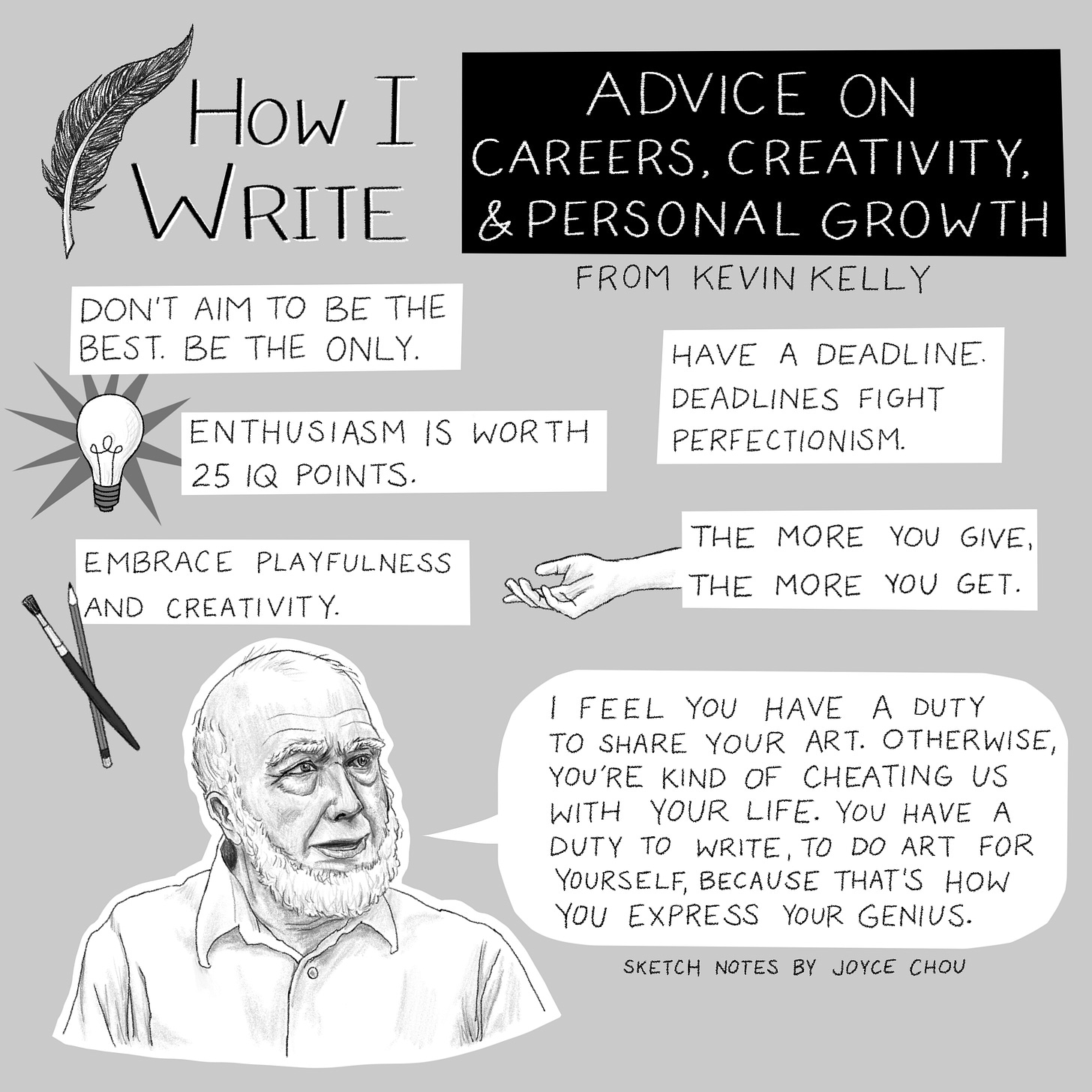Don’t aim to be the best. Be the only.
Advice from writer Kevin Kelly on careers, creativity, and personal growth
“I feel you have a duty to share your art. Otherwise, you're kind of cheating us with your life. You have a duty to write, to do art for yourself, because that's how you express your genius.”
–Kevin Kelly
Quick Summary
The tech writer Kevin Kelly is known for a lot of things: co-founding Wired Magazine, editing the Whole Earth Catalog (one of Steve Jobs’ favorite publications), and photographing 9,000 images across Asia. You can find one of his most viral posts, a compilation of his life advice, here. Although the How I Write podcast focuses on the craftsmanship of writing, Kevin shares a lot of insights about careers, creativity, and personal growth.
You can catch the complete episode (1 hour, 18 minutes) on YouTube.
Key Takeaways
Embrace playfulness and creativity. Talking about his work, Kevin says he’s tried to not have a career—or at least, to not think about it that way. “There's never been any difference between what I do for play and what I would do on my time off,” he explains. Kevin also believes that more people should lean into their playful and creative sides for pleasure, rather than view hobbies solely in terms of productivity or success.
In fact, Kevin feels that we all have a duty to share our art as a way to “express our genius.” His own work reflects his “moral obligation to enable everybody to have the chance to express their genius.” Speaking of genius…
We produce our best work when we’re surrounded by the right people. This is the musician Brian Eno’s concept of “scenius,” which Kevin describes as collective genius. Think Paris in the 1920s, where writers and artists like Hemingway, Picasso, Gertrude Stein, and F. Scott Fitzgerald crossed paths. Scenius runs counter to the myth of the lone genius, which Kevin rejects, believing that “almost none of our ideas are original or solo.”
Scenius thrives in groups and spaces where there is a mutual appreciation of one another’s work, the sharing of tools and techniques, and openness to new ideas. One community where Kevin believes scenius is prevalent: YouTube. Lots of creators are innovating, observing each other, and fueling more new ideas.
Don’t aim to be the best. Instead, be the only. Two great quotes from Kevin about this:
“The thing that made you weird as a kid might make you great as an adult—if you don’t lose it.”
“If at all possible, try to work on something or somewhere where there's no name for what it is that you're doing.”
Enthusiasm is worth 25 IQ points. Kevin offers this piece of wisdom in relation to hiring: Hire people who have an innate love for a subject, even if they lack the skills for the role. You can train them on those skills, but you can’t force enthusiasm.
Kevin recalls his experience leading Wired Magazine in 1993, before the internet had taken off. “We were hiring people to develop the web just as the web was being invented,” he says, “so there were no web developers.” Because of this, Kevin and his team hired based on attitude, aptitude, and enthusiasm.
Similarly, in his publishing and editing work, Kevin says he didn’t focus on candidates’ writing, but rather, their ideas and his conversations with them. It was people’s “ability to be creative, to have ideas, and to structure their arguments” that guided his hiring decisions.
Thoughts
There were so many gems in this interview with Kevin Kelly, but I was struck especially by this 40-second exchange. (Context: Leading up to this point, Kevin and podcast host David Perell are talking about greatness among artists and creators.)
Kevin: “There’s a high price to pay for greatness.”
David: “What price have you paid?”
Kevin: “I’m not great.”
David: “Yeah, you are.”
Kevin: “No, no, I’m not. I’m absolutely not. I’m too calm to be great. It’s sort of like—I’m much more balanced and not that extreme.”
David: “What trade-offs have you had to make in order to be Kevin Kelly?”
Kevin: “…To be Kevin Kelly, I couldn’t be great.”
You can’t misread Kevin as just being modest or insincere in the moment. He’s adamant that he’s not great. And yet, he’s got a long list of reputable bylines and has even given a TED talk. Tim Ferriss once called him “arguably the real-life most interesting man in the world.”
Kevin’s self-identification as “not great” is consistent with his advice to create for the sake of pleasure, without an agenda in mind. It seems that his approach to his career—that is, not to have one but rather, to make work and play be indistinguishable—is rooted in an intrinsic desire to just create.
I love it. In today’s online world of chasing virality and audience building, it might seem naive or old-fashioned. Even if he disagrees, Kevin Kelly is great, but what is perhaps more meaningful is that he doesn’t care about being great in the first place. I aspire to have the same mentality.
If you made it this far, thank you for being here! The best way to support Sketch Pad is by liking this post on Substack or sharing these notes with someone who might enjoy them. And if you’d like to, reply to this email (or leave a comment on Substack) with your podcast recommendations.
–Joyce





“The universe is conspiring behind your back to make you a success. This will be much easier to do if you embrace this pronoia.” — Embrace pronoia!!
I love that - “create for the sake of pleasure”, and, the importance of enthusiasm!